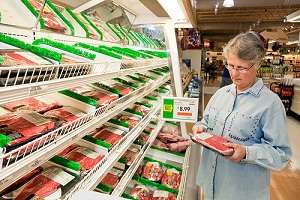Consumer understanding needed more than ever in food production

The increasing rejection of farming technology like hormonal growth promotants (HGP) should be regarded as unethical according to a scientist whose paper was recently published in the journal of Animal Production Science.
The article by Ian Lean investigates the effects of societal, government and retailer pressure on antibiotics in chicken and hormonal growth promotants for cattle.
It details how 'marketing ploys' like Coles' hormone-free beef campaign are unethical because they prioritise marketing; over animal care, over reducing the environmental impact of production and over helping producers make a profit—all of which can be enhanced by the use of HGPs in beef cattle and antibiotics in chicken.
Professor Lean says consumer activism supporting such measures as HGP-free beef is driven by a naturalistic fallacy—where supporters equate natural conditions with better outcomes. He predicts such activism will increase as consumers become less connected to the land and farming technology.
"If we relied on such 'natural systems', humans would live to an average of about 35 years, have a high risk of death in childbirth, and suffer high rates of infant mortality," the report says.
"Natural or organic systems cannot provide sufficient food to feed the current human population."
West Australian Beef Council chairman Tony Hiscock agrees consumers need to develop a better understanding of agriculture methods like those used to produce quality beef.
But he says the impact of the Coles' HGP-free campaign has not been that great on WA growers compared to other states, despite high levels of concern among growers initially.
"What has happened is that producers are producing animals to the required specifications," he says.
"All of a sudden Coles has increased its kill by 20,000 animals a year in WA since it [the ban] has been happening.
"That's because they have decided that rather than bringing in beef from other states they have decided to source their beef for WA consumption in WA.
"If Coles is sourcing more of its meat from WA on an ongoing basis then that's a plus.
"Ultimately what we need to understand is that it is the consumer who is going to drive what is required.
"If consumers are demanding a HGP-free product, then that is what producers have to produce."
Prof Lean says that one of the biggest challenges facing the planet is the need to feed between 9 and 9.6 billion people by 2050. Estimates are 100 per cent more food will be needed than is currently produced.
More information: Lean Ian J. (2013) Effects of retailer pressure on the efficiency of agricultural industries. Animal Production Science 53, 1143–1148. dx.doi.org/10.1071/AN13178
Provided by Science Network WA


















